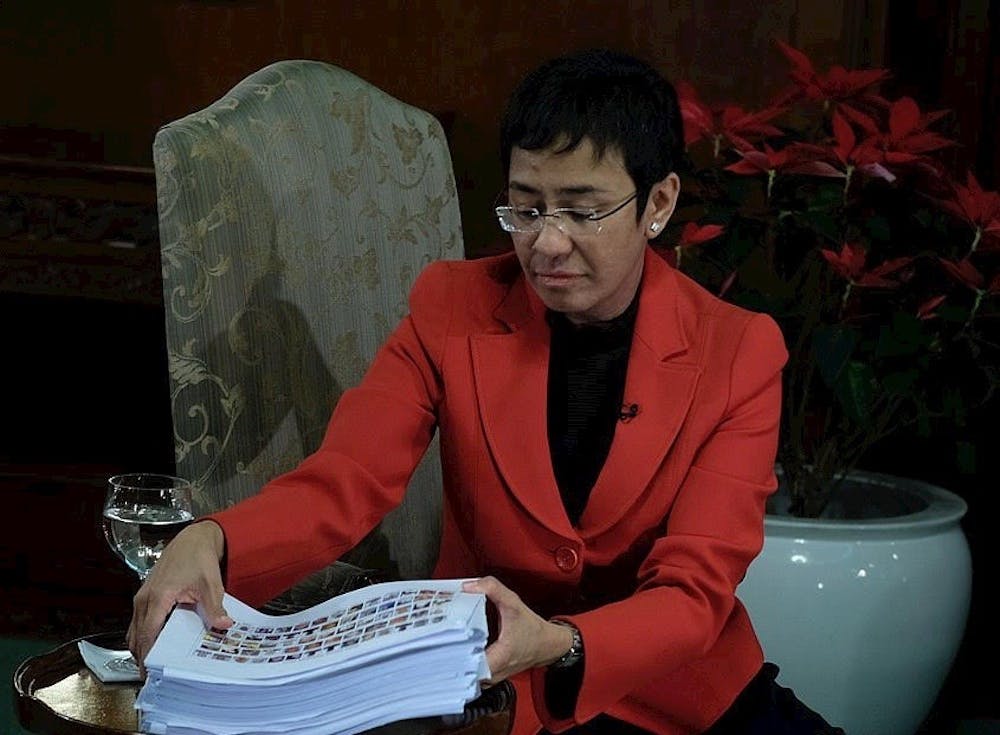Last week, journalist Maria Ressa ’86, the founder and CEO of the online news organization Rappler, turned herself in to Philippine authorities to face tax evasion charges.
On Nov. 9, the Philippine government announced charges against Ressa and Rappler, alleging that the company failed to declare $3 million it received from a 2015 investment by philanthropic investment firm Omidyar Network. Ressa claims she and her company are innocent, and she joins other journalists in branding the charges as retribution for Rappler’s criticism of Philippine president Rodrigo Duterte and his government.
On Monday, Dec. 3, Ressa posted bail (about $1,100) after being arrested upon her return to the Philippines. Met by reporters at Manila’s Ninoy Aquino International Airport, she emphasized her innocence and noted that these charges stem from the Philippine government’s misclassification of Rappler as a “stock brokerage agency” instead of a news organization.
Rappler tweeted a video of Ressa being interviewed in the airport, in which she expressed that the arrest warrant made her feel “vulnerable.”
"But I think that’s the point, right?” Ressa said in the video. “The point is for the government to actually make you feel its power and that it can do what it wants to do, including bending the law to the point that it’s broken.”
Throughout the eight-minute video, however, Ressa maintained a confident tone. She added that she was optimistic about winning the legal battle with the Philippine government in the long term.
“I am going to hold my government accountable for publicly calling me a criminal,” she said.
“We’re doing nothing but good journalism. We’re serving our public. Let us continue to do so,” Ressa later added.

Ressa’s work has recently garnered the praise of several journalistic and human rights advocacy groups, and she has used this attention to speak about Rappler and issues for journalists at large. On Nov. 21, she received the 2018 Gwen Ifill Press Freedom Award from the Committee to Protect Journalists, conveying in her acceptance speech the importance of speaking out without shame.
“We at Rappler decided that when we look back at this moment a decade from now, we will have done everything we could: We did not duck, we did not hide,” she said.
She has also received prestigious awards such as the Golden Pen of Freedom from WAN-IFRA, the Knight International Journalism Award, and the Free Media Pioneer Award from the International Press Institute.
Even as she faces these charges, Ressa continues to speak out politically. She has discussed similarities between Duterte and President Trump, noting that only a week after Trump used the term “fake news,” Duterte borrowed it to refer to Rappler. She also said the White House’s attempt to revoke Jim Acosta’s press credentials was akin to Duterte’s ban of journalists like herself from Malacañang Palace, where the president works and resides.

Ressa has also been critical of technology companies such as Facebook, describing the role they play by allowing the dissemination of falsehoods and propaganda.
Ressa did not respond to requests for comment from The Daily Princetonian.
William Englund, a Washington Post editor who currently teaches a journalism course called “Covering Hostile Governments” at the University, spoke about Ressa’s impact in journalism.
Describing her as “very brave” to stand up to Duterte’s pressure, Englund supported her claim of innocence. He also referenced a recent trend in which authoritarian governments have put financial pressure on news organizations, citing examples in Russia and Hungary.
“The government claims that … [Rappler] should have registered as essentially securities brokers [before receiving an investment from the Omidyar Network], which she argues, very plausibly, is ridiculous,” he said.
He did share some of Ressa’s optimism for Rappler, noting that Duterte “is probably bluffing, to some extent, and might himself buckle when faced with genuine resistance.”
Founded in 2012, Rappler has only recently been at the center of conflict with the Philippine government. In 2017, the organization was investigated for a complaint of “cyber-libel” and later had its license revoked by the Philippine Securities and Exchange Commission. Several individual Rappler employees have also been targeted, being banned from the presidential palace and even receiving rape and death threats.
For now, it is uncertain what Ressa’s fate will be and when — assuming the government pursues the case —the judicial process will begin.








